November 14, 2025. Dong-A Ilbo Interview, KC Tech Invited Lecture, Happy Dialogue (6) Cheonan
Hello. Today was packed with various schedules including interviews, invited lectures, and Happy Dialogue Dharma Q&A sessions.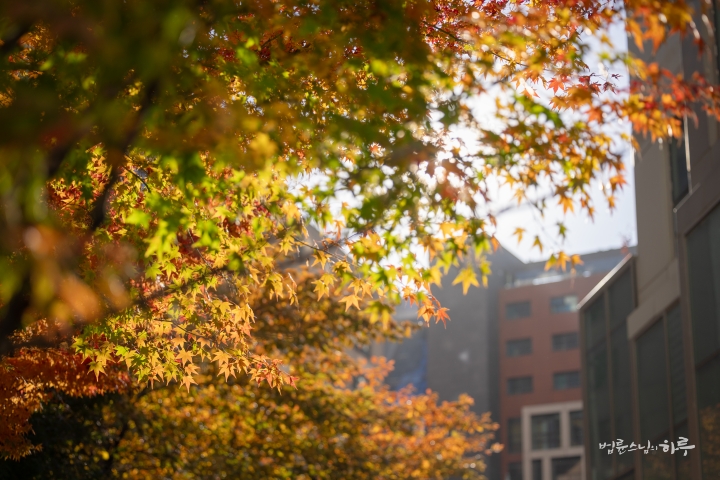
After completing his morning practice and meditation, Sunim headed to the Jungto Social and Cultural Center for an interview with Dong-A Ilbo. After warmly greeting the reporter who had come to visit early in the morning, the interview began at 8 AM in the reception room on the 10th floor.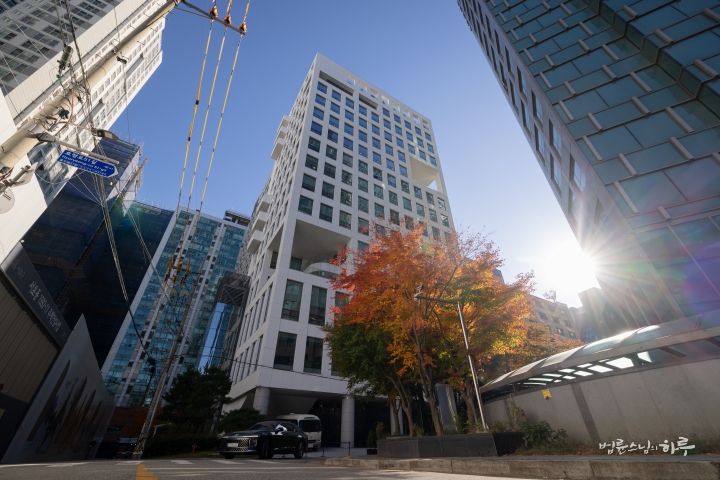
The reporter asked Sunim in-depth questions on various topics including: the reasons for hosting the Youth Festa, the difficulties and social perceptions of today’s youth generation, the reasons and methods for conducting relief activities overseas, Jungto Society’s perspective on religion and practice, his position on the proposal to create an ‘AI Avatar of Venerable Pomnyun Sunim,’ solutions for peace on the Korean Peninsula and North Korea-US/inter-Korean relations, Jungto Society’s operational methods and the concept of Mosaic Buddha, and Sunim’s personal concerns.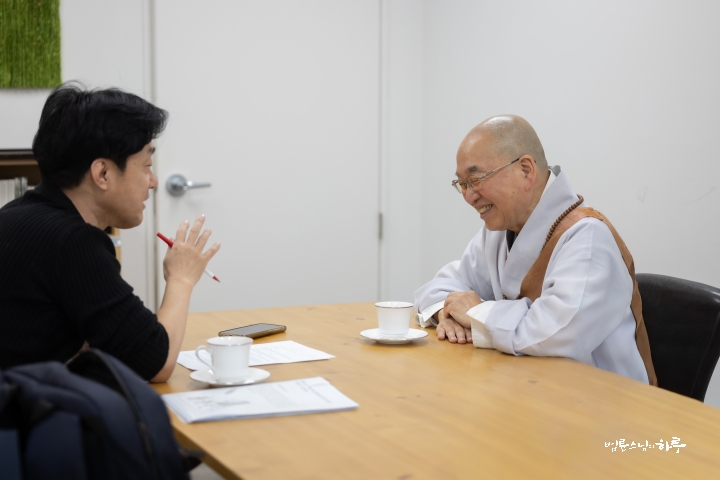
The reporter was particularly curious about how Sunim could answer all questions during Dharma Q&A sessions.
“Even as a venerable monk, you can’t possibly answer every question. There must have been times during Dharma Q&A when you faced difficult questions or situations where it was hard to respond.”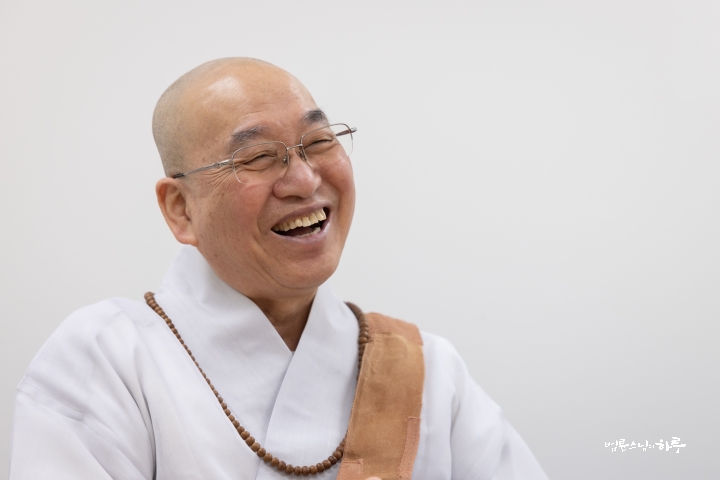
“I don’t think of it as ‘giving answers’ but rather as ‘having a conversation.'”
“So that’s why it’s called ‘instant questions, instant explanations’ rather than ‘instant questions, instant answers.'”
“Exactly. If there’s a question that really requires an answer and I don’t know it, I simply say ‘I don’t know.’ It’s not difficult at all. I can just say, ‘I’m not sure about that, why don’t you search for it on the internet?’ and that’s it.”
“I thought it was a sharp question, but it turned out to be a foolish one.”
As the reporter looked embarrassed, Sunim continued with a smile.
There Are No Right Answers in Dharma Q&A, Only Awakening
“Dharma Q&A is not a place to give correct answers to questions. As we converse, two types of changes occur. First, there are cases where the questioner realizes on their own, ‘Oh, it’s not a big deal.’ They initially thought it was a major problem, but through our conversation, they come to understand ‘it’s not really a problem.’ In Buddhist terms, they realize the truth that ‘all phenomena are empty.’ Things in the world are inherently not significant issues, but they become problems when thoughts become entangled. Second, through conversation, questioners often find their own direction, saying things like ‘I see, I can do it that way,’ ‘I’ll try once more,’ or ‘I’ll take a break.’ They determine their own path of action.”
“For example, when we discuss a question like ‘My parents are unwell, how should I help them?’ through conversation, the questioner might lightly accept it thinking ‘This isn’t really a big deal,’ or they might establish their own standard for action thinking ‘I can do it this way.’ When this happens, from the questioner’s perspective, they feel they’ve ‘found an answer.’ So they think ‘Sunim gave me a good answer.’ However, I’ve never thought of myself as giving answers. I always say ‘There are no right answers in life.’ I merely guide the direction of the conversation slightly so that the questioner can achieve self-awareness on their own.”
Finally, after discussing the reasons and methods for Sunim’s sustainable development work in Bhutan and JTS’s principles for relief activities, the interview concluded after 9:30 AM.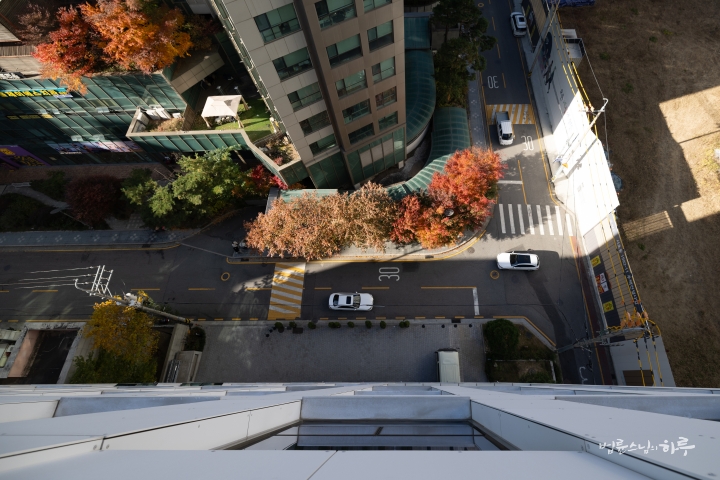
After finishing the interview, Sunim headed to the broadcasting room at Jungto Center. At 10 AM, the Friday Dharma Q&A live broadcast began. This is a day when Dharma Q&A is broadcast in the morning once a month for those who find it difficult to watch during evening hours. With about 2,000 people connected to the live broadcast, Sunim gave his greeting.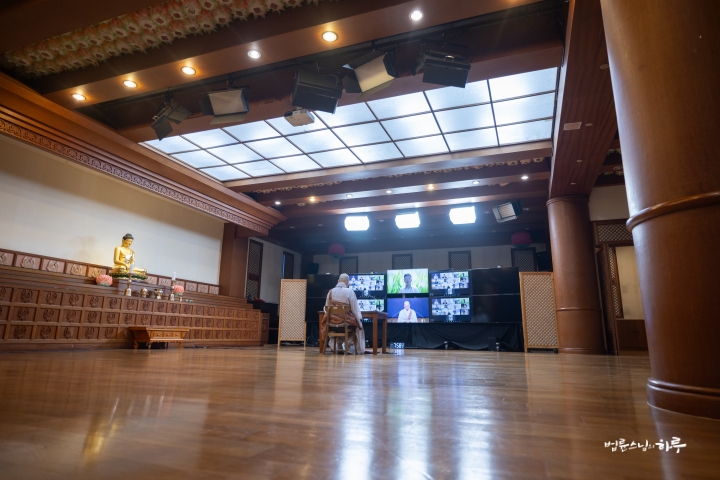
“Autumn has deepened considerably. This morning the temperature dropped sharply and it was quite chilly. There are forecasts that it will drop below freezing next week. It seemed like autumn had finally arrived only in mid-October, but now winter is already approaching quickly. It seems the climate is gradually changing with spring and autumn becoming shorter while summer and winter grow longer. Still, we are now in the middle of the most beautiful autumn. I’m very pleased to meet you all in such a wonderful season.”
Participants then pressed the hand-raising button and asked Sunim about their life concerns. For one hour, four people shared their worries and had conversations with Sunim. After answering all questions, Sunim gave his closing remarks.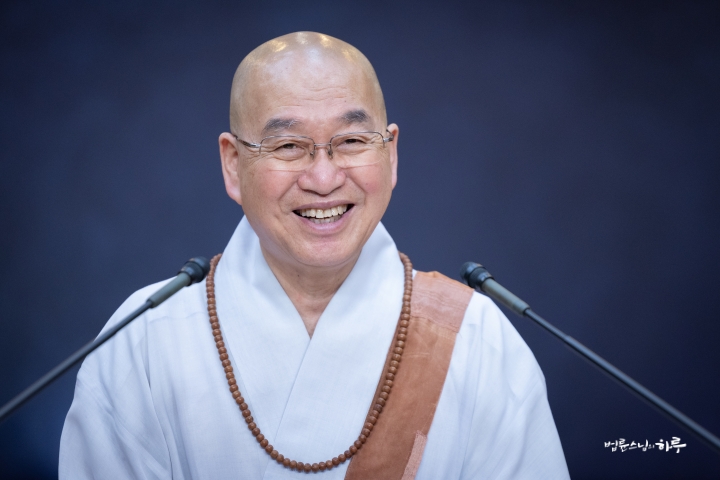
“Whether online or in person, anyone with concerns can apply and ask questions. This evening there will also be a Dharma Q&A lecture in Cheonan, so you’re welcome to come in person and have a conversation. Even if you don’t ask questions directly, just listening to others’ questions can be very helpful in resolving your own concerns.”
“Rabbits live, squirrels live, so why do people say ‘life is hard’? If that’s true, it means humans are inferior to rabbits or squirrels. Animals also give birth to and raise their young, but they don’t complain that ‘parenting is difficult.’ This doesn’t mean your parenting isn’t challenging. Rather, it means we need an attitude of willingly accepting what is given to us. It becomes difficult because we try to do too much.”
“Parents just need to watch over their children as they play. Children fighting and quarreling with each other is also a process of learning about life. If a mother dog worried and followed her pups around every moment like humans do, how could she raise so many puppies at once? Animals nurse their young, bring them back when there’s danger, and otherwise leave them alone to grow. This way they grow toward independence even while being protected. Parenting should also be done with a bit more relaxation like this. I hope you all live happily.” 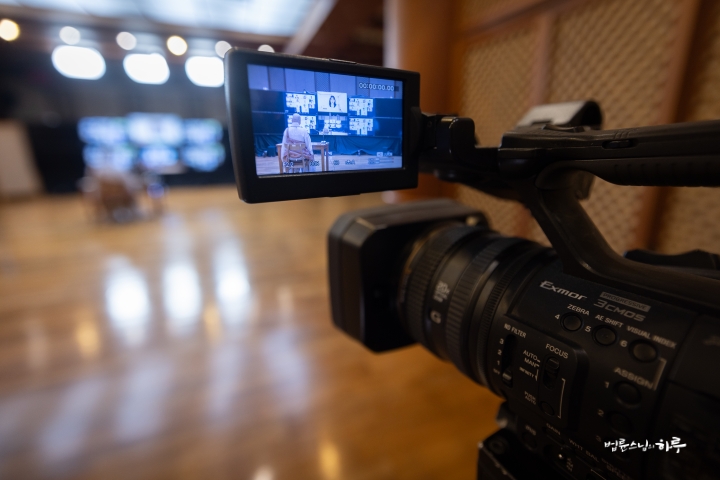
After finishing the live broadcast, it was almost noon. Sunim immediately headed to the Peace Foundation. After having lunch with a guest who visited the Peace Foundation, he spent about an hour discussing the direction of South Korea’s national governance. In particular, Sunim offered much advice on what role the executive branch should play to achieve national unity amid the increasingly severe confrontation between the ruling and opposition parties.
After taking a commemorative photo together and seeing off the guest, Sunim departed from Jungto Center at 2 PM and headed to Anseong City, where KC Tech Company is located.
KC Tech is a mid-sized company that supplies equipment necessary for semiconductor manufacturing. Many employees who have attended the Awakening Retreat conducted by Jungto Society work there. This is the result of the company president, who had such a positive experience at the Awakening Retreat, continuously recommending it to employees. There had been requests for a long time to give a lecture for the company employees, and since a lecture was scheduled in Cheonan today, Sunim agreed to stop by on the way.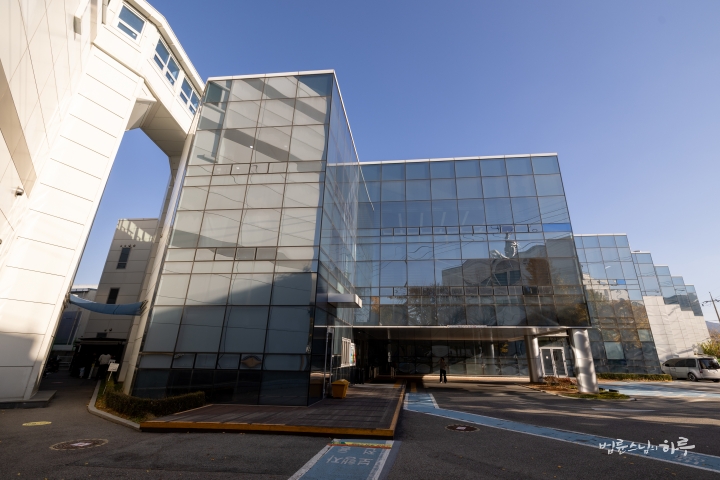
When Sunim arrived at KC Tech at 3:20 PM, CEO Yang Ho-geun and the employees warmly welcomed him. Mayor Kim Bo-ra of Anseong City, where the company is located, also attended and exchanged greetings.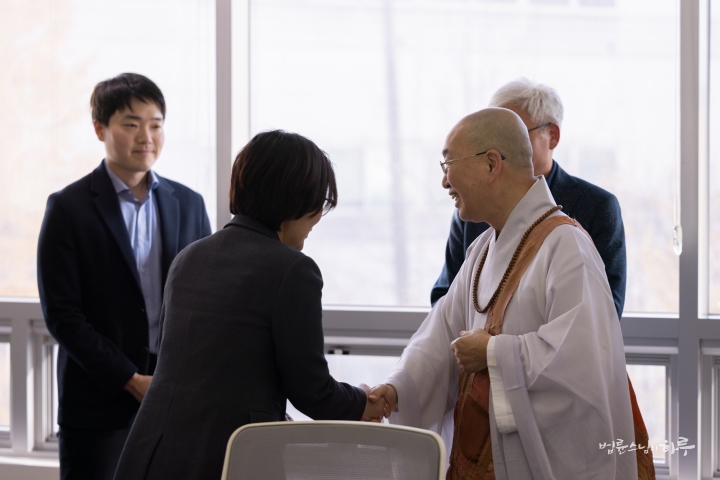
“I’m the mayor of Anseong City. I’m also an alumnus of the Awakening Retreat. I came because I heard Sunim was visiting. I thought it would be a good opportunity to learn what young entrepreneurs are thinking these days.”
Sunim asked with a smile.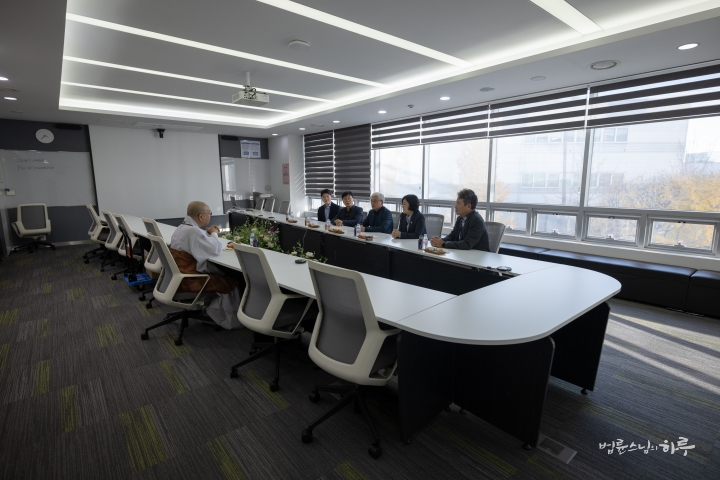
“I heard that many people at this company have attended the Awakening Retreat.”
CEO Yang Ho-geun replied.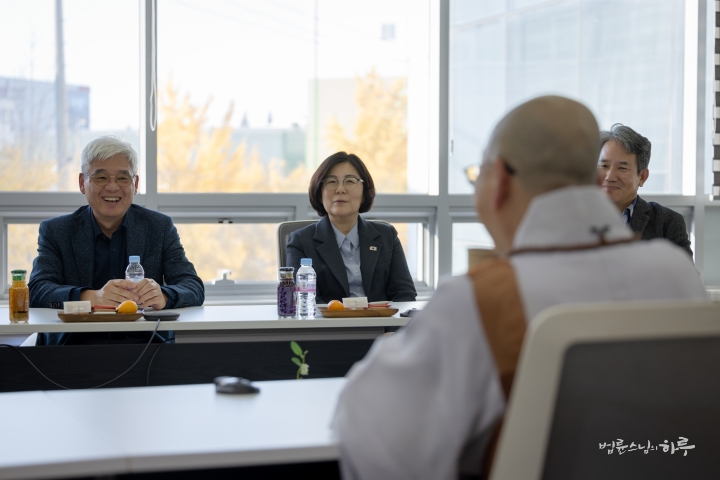
“I don’t force them to go. Everyone attended because they personally wanted to. Many people have attended the Awakening Retreat so far. One employee came back from the Awakening Retreat and said, ‘My birthday has changed.’ He meant he was reborn. There’s also an employee who had been on bad terms with his father but reconciled after attending the Awakening Retreat. On the other hand, there are cases where someone says they’ve changed a lot, but from the outside, it doesn’t seem like much has changed, so others say ‘I don’t need to go.'” (Laughter)
CEO Yang showed a photo of himself attending the Awakening Retreat in the United States.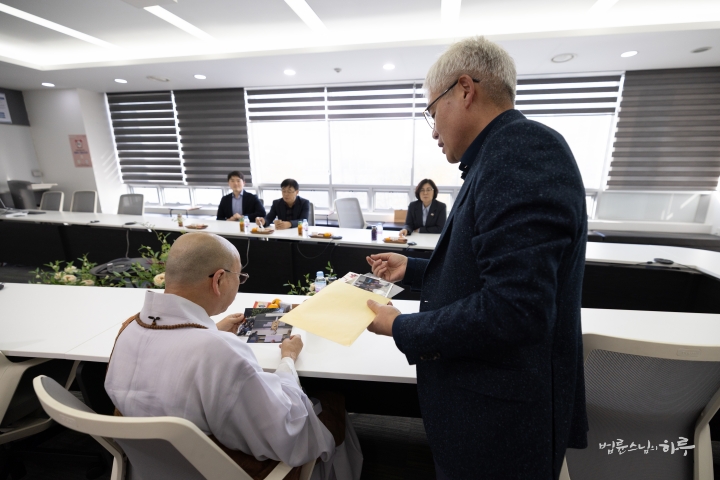
After hearing about the changes in company employees who attended the Awakening Retreat, Sunim said.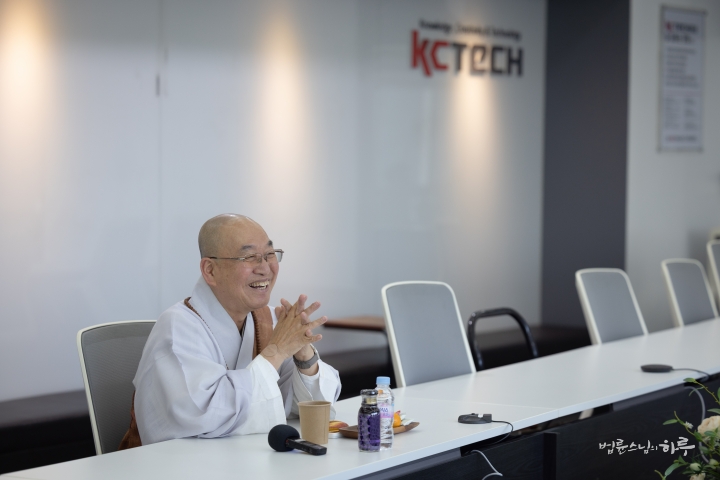
“Most people tend to live trapped in their own thoughts. Many live their entire lives without properly examining whether those thoughts are actually correct. The ‘Awakening Retreat’ provides a precious opportunity to reflect on and examine those thoughts.”
The mayor of Anseong City and the CEO of KC Tech expressed their gratitude, saying that many people’s lives have become happier through the Awakening Retreat. As they conversed, it was time to begin the lecture. After taking a commemorative photo together, they moved to the auditorium.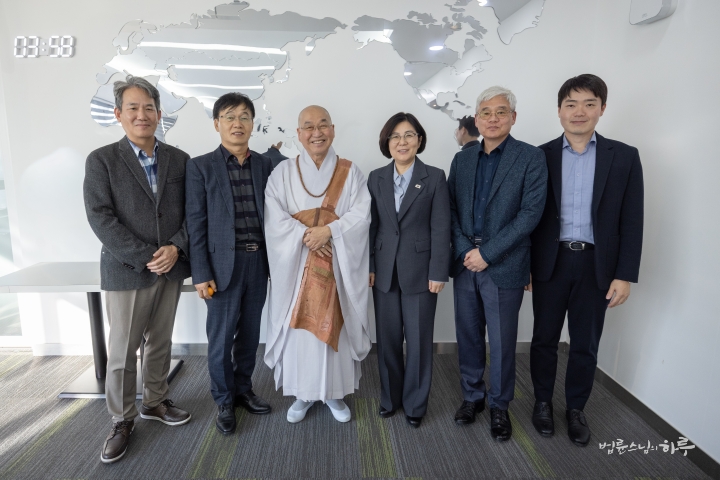
About 300 employees were seated in the auditorium. After hearing greetings from Mayor Kim Bo-ra of Anseong City and CEO Yang Ho-geun of KC Tech, Sunim came up on stage to great applause.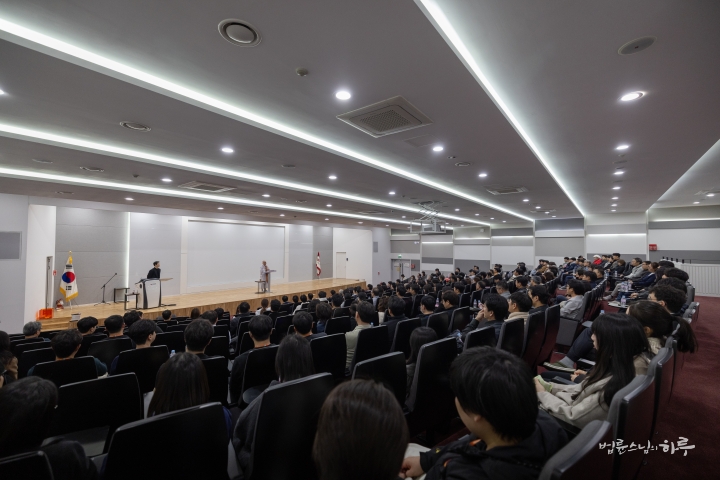
Sunim began the conversation by introducing how today’s lecture came about.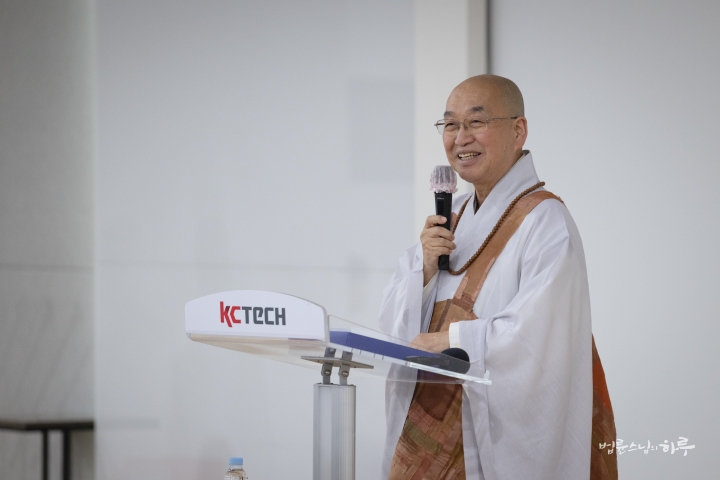
“I think this is the first time in about five years that I’ve given a lecture at a private company. Since I consider lectures to be ‘conversations,’ I conduct them without charge. As a result, I’ve naturally prioritized institutions that work for the public good, such as the Army Headquarters, police stations, and district offices. It’s not that I don’t want to give lectures at private companies, but rather that public sector schedules have taken priority, so I haven’t had much time. However, there’s a special connection that brought me to KC Tech. I heard that many KC Tech employees have attended the ‘Awakening Retreat’ program run by Jungto Society. So there have been several requests for me to stop by and have a conversation rather than give a formal ‘lecture,’ and I promised, ‘I understand. I’ll stop by when I have the opportunity,’ but I hadn’t been able to fulfill that promise due to scheduling conflicts. But as it happens, I have a lecture for citizens in Cheonan this evening, so I was able to arrange to stop by on the way. That’s how I came to meet all of you in person today.” 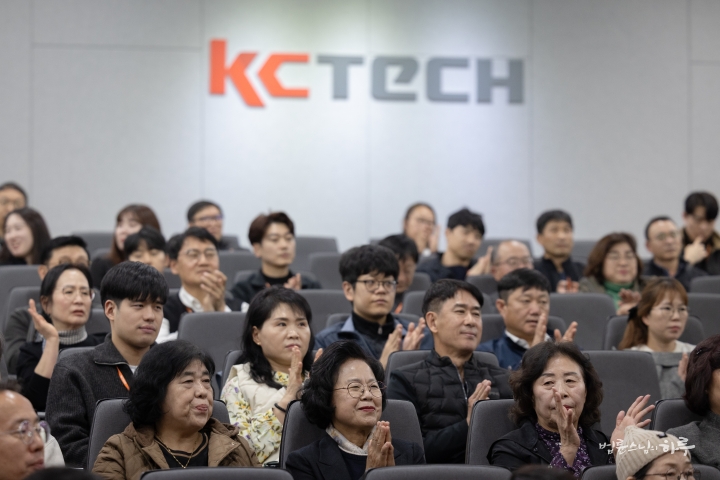
The KC Tech employees welcomed Sunim with enthusiastic applause. Then, Sunim took questions from those who had submitted them in advance. Although the questions were submitted anonymously, Sunim read each question and found the questioner to have a direct conversation with them.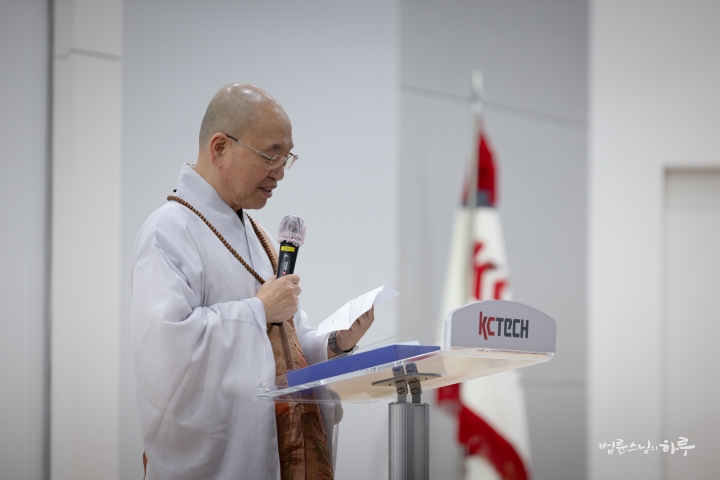
Six people asked questions during the hour and a half session. One of them shared her struggle about her husband rarely coming home.
My Husband Only Brings Home His Paycheck but Never Comes Home. How Long Should I Put Up with This?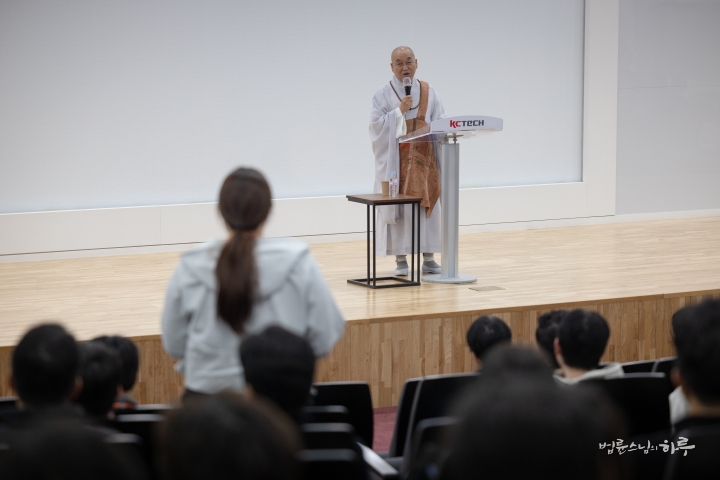
“So what’s the problem? You should be grateful he at least brings home his paycheck. Let me give you an example. I always go to churches or cathedrals on Christmas. In Jungto Society, we have quite a few lapsed Catholics. So when I go to churches or cathedrals, I gather people who used to attend and form a choir team. We go together and sing ‘Joy to the World.’ In Catholicism, once you’re baptized, you remain Catholic unless you convert to another religion. We have many such people in Jungto Society. I take them to the priest and say:
‘Father, I’ve brought back your lost sheep. Please take better care of them from now on.’
The priest looked at all of us, smiled, and said:
‘Let them pay their tithes to the cathedral, and you take care of managing them, Sunim.’ 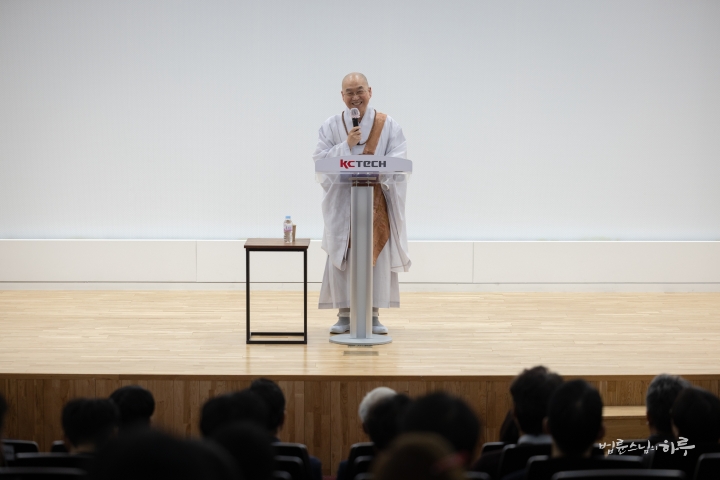
What a brilliant statement! How wonderful is that? I manage them while they pay their tithes to the cathedral. The reason I’m telling this story is because you’re in exactly that situation. Your husband pays all his tithes to you and then goes out. How wonderful is that? It would be a problem if he went out without paying his tithes, but since he faithfully brings home his paycheck as promised, shouldn’t you give him that much freedom?”
“But he goes to the beach so often on his days off that he doesn’t spend much time with the kids. I wish he would stay home and help with something, but he just does his own thing and goes out.”
“But if you divorce him, you won’t receive those tithes anymore. It would be wonderful if he brought home his paycheck, made time to spend with you, played with the kids, and helped with cleaning. That would be perfect, no question about it. But did you accumulate that much merit in your past life? Just meeting a man who gives you his paycheck is already a great blessing. (laughter) 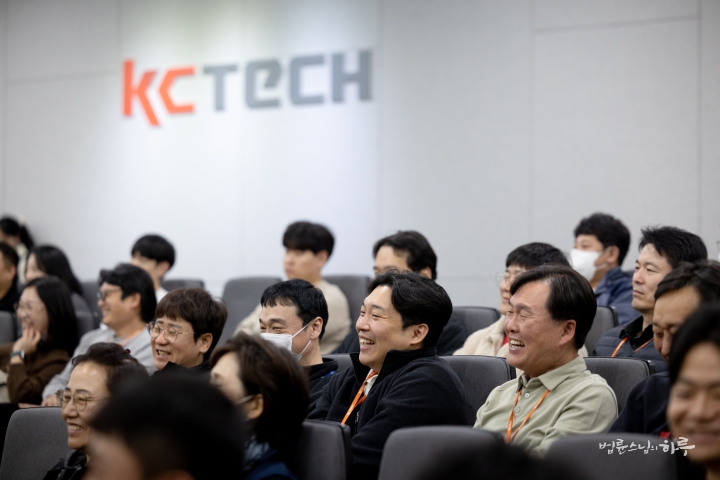
Think of it as if you were divorced. You would have to take care of the children and do all the cleaning yourself. In your case, your husband faithfully provides his tithe and occasionally sleeps with you when you feel lonely. Now, imagine living alone without a husband and taking care of a ‘swallow’ man (a Korean slang term for a gigolo). How risky would that be? I fully understand that not all your desires are being met. However, in this world, not everything can go as we wish. While your husband may not meet all your expectations, he hasn’t caused you any harm. He doesn’t hit you or take your money away. Instead, he contributes financially, though he helps less with household chores. At least your husband isn’t doing anything that causes you loss. So he’s not a bad person. He’s just not the level of husband you want. If you can find someone better, go ahead and change now. It’s good to switch if you have a better option, but that doesn’t mean your current husband has any problems.
So try to have this perspective: ‘My husband is not a problematic man.’ It’s true that he falls short compared to a better man. But better men always come with a price – if they have money, they’ll act accordingly, and if they’re handsome, they’ll leverage their looks. That’s just human nature. And it’s not like he’s having an affair. I think having many club meetings or drinking appointments is something that can be overlooked.”
“Thank you. I understand well.”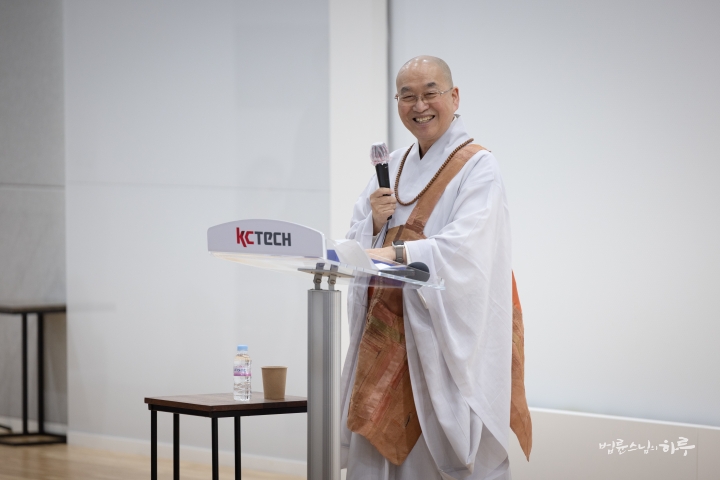
“What’s important here is that when we evaluate things, we need to carefully consider what our standards are. For example, in a company, when looking at other employees, we might think, ‘They don’t produce as much as I’d like, but they’re better than nothing.’ If they at least answer phones and help in some way, there’s no need to complain. Of course, I understand the thought that ‘it would be nice if they were better.’ But just because someone doesn’t meet our expectations doesn’t make them a bad person.
I often tell children not to resent their parents. This is because while it’s true that parents didn’t do as much as their children wanted, parents rarely cause actual harm to their children. This is especially true when they’re young. They fed you and gave you a place to sleep. Of course, they didn’t do everything their children wanted. That’s why children are dissatisfied with their parents. But parents didn’t cause you loss. Therefore, there’s no reason to resent or hate them.
Similarly, in your case, the most important thing is that your husband is paying his tithe. This is something worth appreciating. It would be problematic if he didn’t pay the tithe. So the problem isn’t with your husband, but rather your dissatisfaction comes from having too many expectations. You should think, ‘At least he faithfully pays his tithe’ when dealing with your husband. The more you pressure him, the more he’ll want to escape. But if you keep things open, first you won’t suffer, and furthermore, you can expect some small changes. I hope you’ll try changing your perspective like this.”
“Thank you. I understand well.”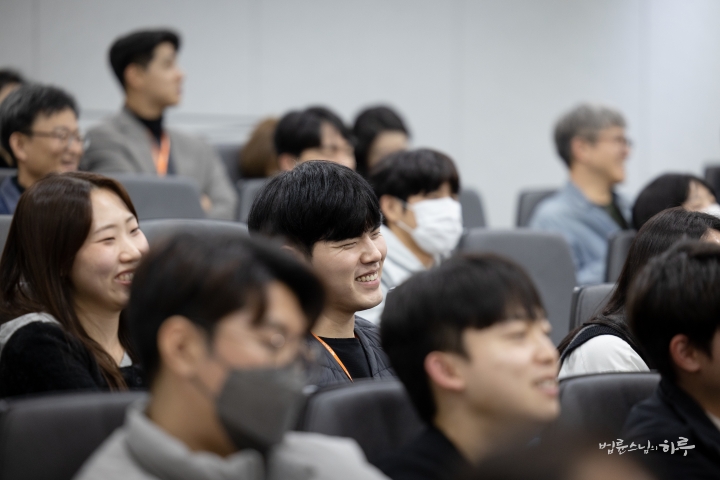
Questions continued one after another. After discussing various topics including the pain of not being recognized, worries about teenage children, stress from a boss’s harsh tone, and children facing withdrawal from school, Sunim gave his closing remarks.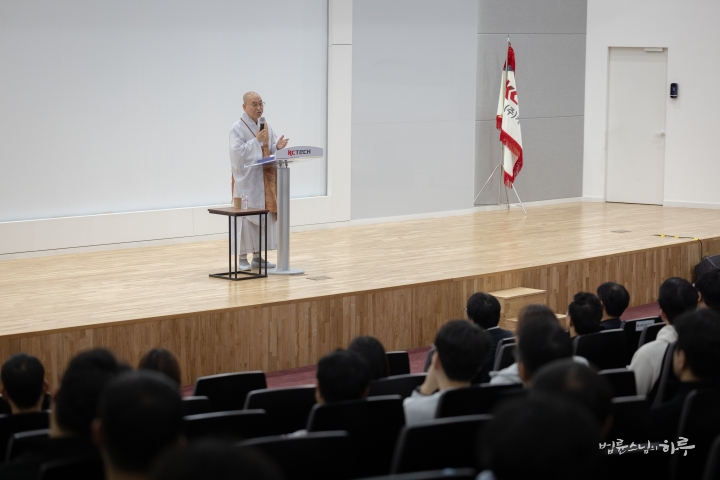
“Since I’m here, I’d like to introduce a program to you. It’s called ‘Happiness School.’ Anyone can be happy, and anyone can learn happiness. It’s a school that operates purely on the theme of happiness, with all religious rituals removed. There’s also a retreat called ‘the Awakening Retreat.’ This also has no religious elements. If you participate in these programs, your fixed ideas will be broken and the world will look much broader and better. Your life is yours to live as the master, and Buddha and Jesus are those who help you with this.”
The lecture ended with loud applause.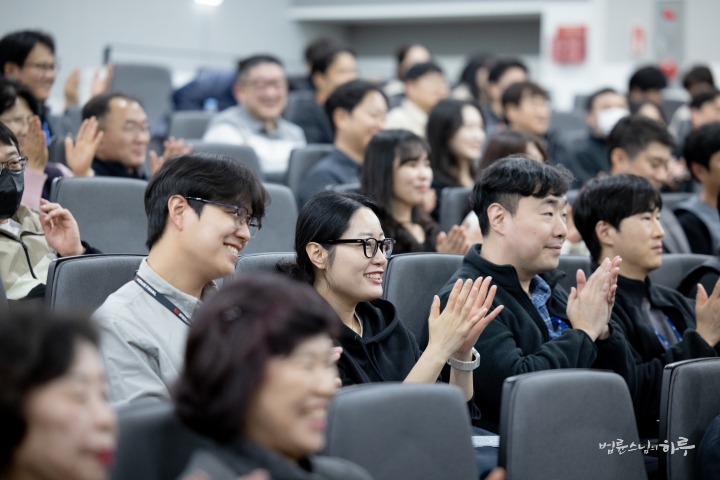
Sunim exchanged greetings while being seen off by the CEO of KC Tech and the mayor of Anseong City, then got back in the car. He immediately departed from Anseong City and headed to Cheonan City.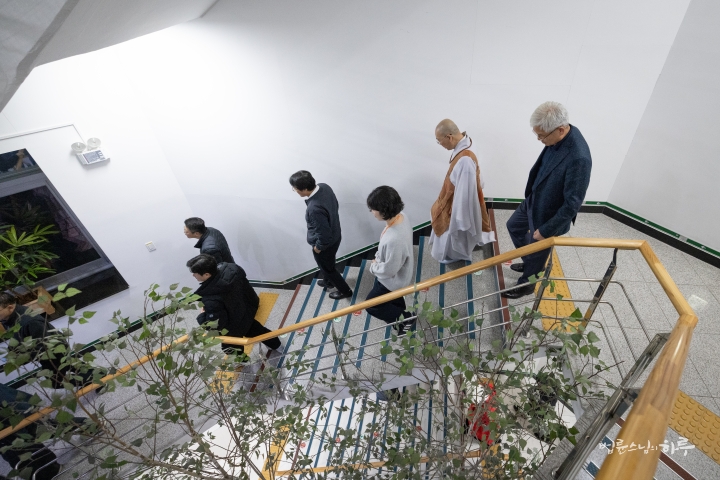
After a 30-minute drive, they entered downtown Cheonan City. After stopping at a noodle shop near the lecture hall for a bowl of noodles for dinner, they headed to the venue.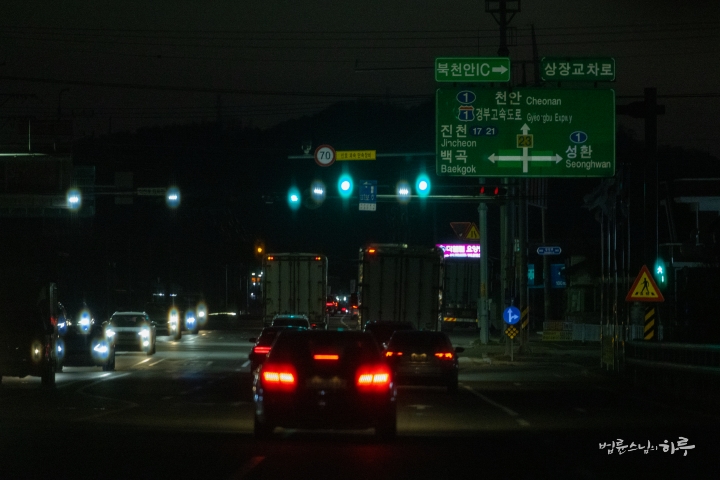
Today’s lecture was held at Bongseo Hall in Cheonan City Hall. When Sunim arrived at the venue, the Happy Citizens of Cheonan who had prepared the lecture were warmly welcoming citizens. In front of the reception desk, many citizens had gathered to hear Sunim’s lecture, creating a sea of people.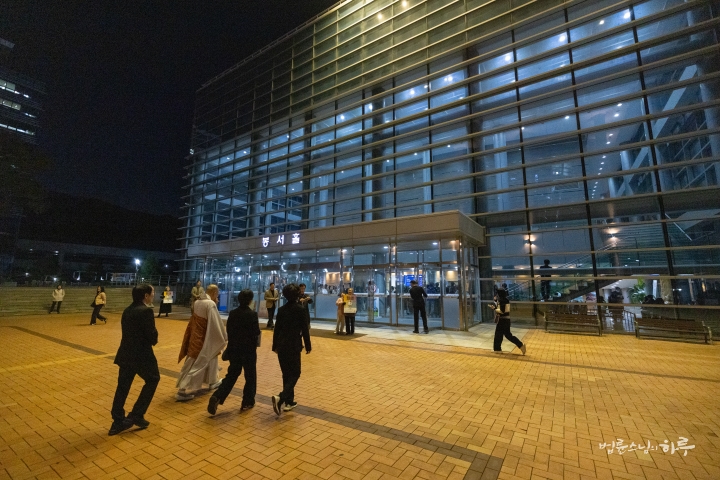
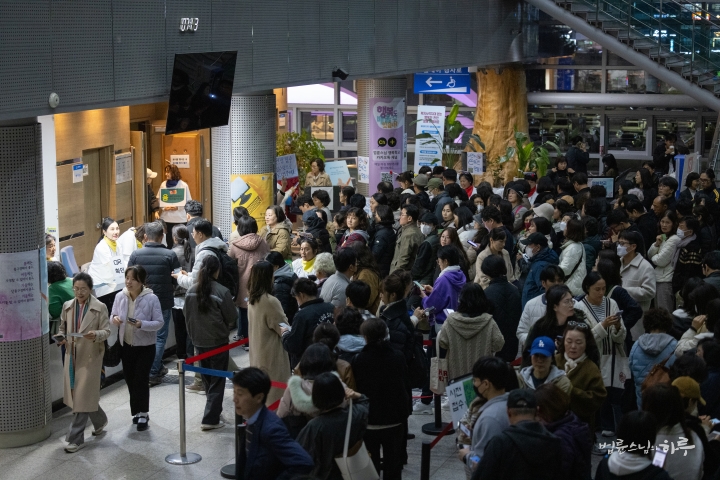
After warmly greeting the citizens who came to the lecture hall, Sunim entered the venue. With about 1,000 citizens filling the seats, singer Choi Yu-kyung was performing a pre-show. Ms. Choi Yu-kyung, who advanced to the finals in the JTBC impersonation competition, took the stage today as a talent donation and enthusiastically sang ‘That Person from Sinsa-dong’ and ‘Unrequited Love.’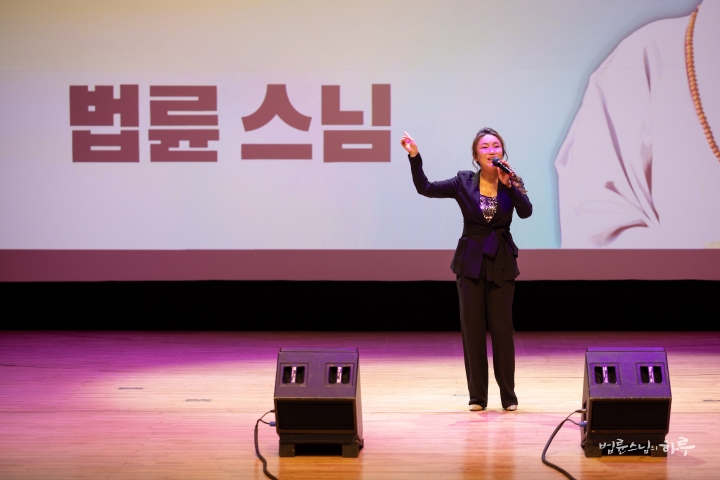
After heating up the atmosphere in the lecture hall and finishing her performance, Sunim presented Ms. Choi Yu-kyung with a signed book backstage and took a commemorative photo together.
“Thank you.” 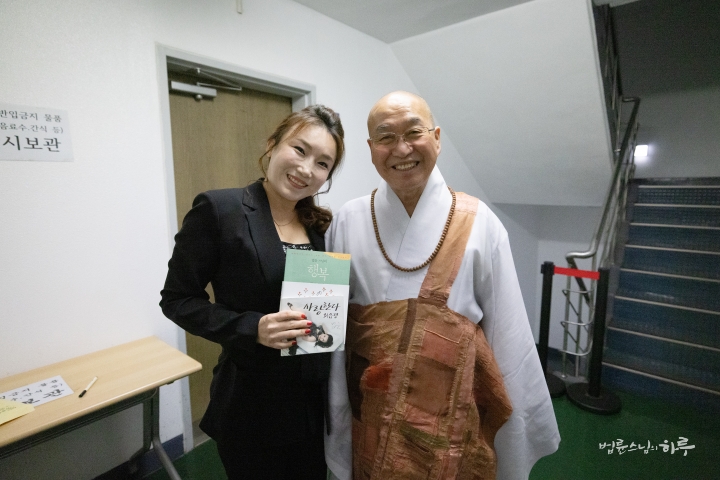
Next, a video introducing Sunim was shown, and when it ended, Sunim walked out to loud applause.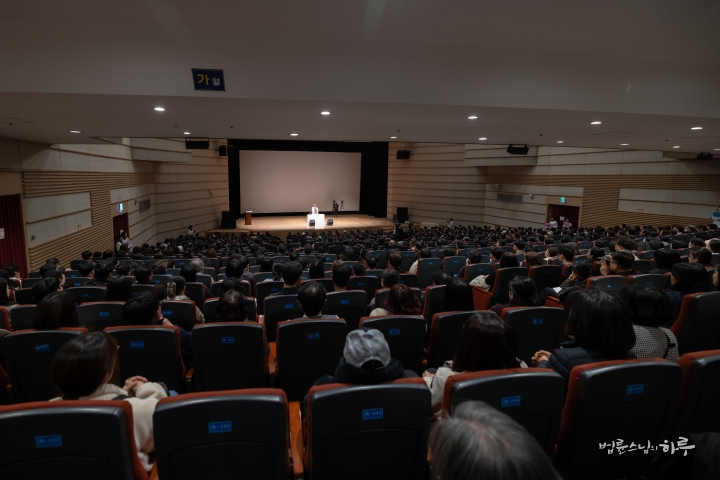
First, Sunim smiled and greeted the citizens of Cheonan.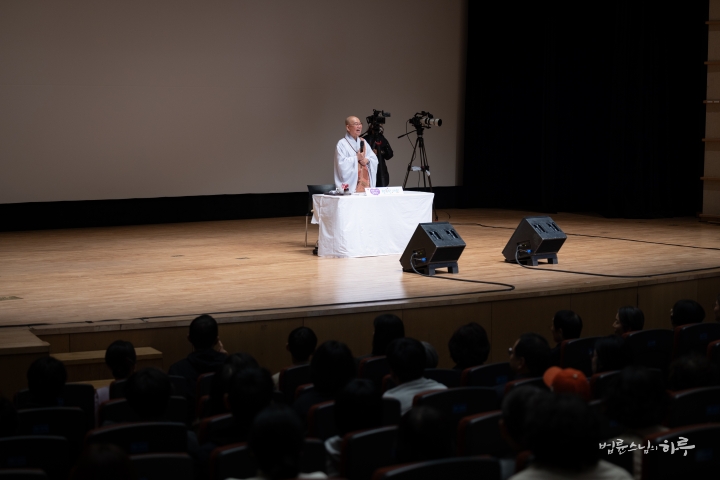
“Since I give all my lectures for free, anyone who appears in my lectures must also perform for free. So Ms. Choi Yu-kyung had a paid performance scheduled today, but she canceled it to give this free performance. Please give her another round of applause. The City of Cheonan provided the lecture venue for free, I, Pomnyun Sunim, am giving the lecture for free, and everyone running the lecture is participating as volunteers, making today’s lecture possible. This event was created with the intention of showing that ‘not everything in life has to be a monetary transaction.’ Please give a round of applause to all the volunteers as well.” 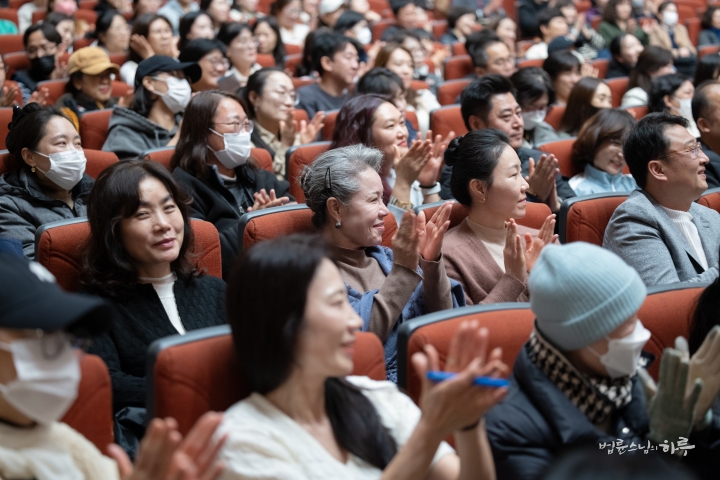
With applause and cheers behind him, Venerable Pomnyun Sunim’s Dharma Q&A officially began. Five people who had applied for questions in advance asked first, followed by three people who raised their hands on-site to have conversations with Sunim. One of them sought Sunim’s advice, troubled by his blunt way of speaking that hurt his beloved wife.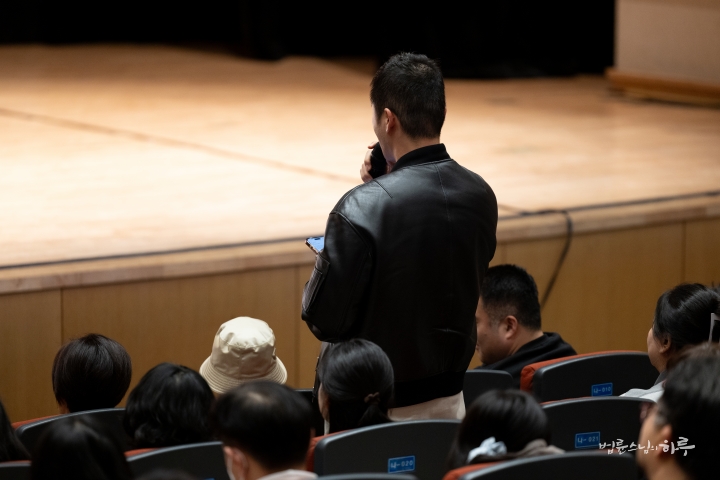
I Know My Wife Gets Hurt, but My Blunt Way of Speaking Doesn’t Change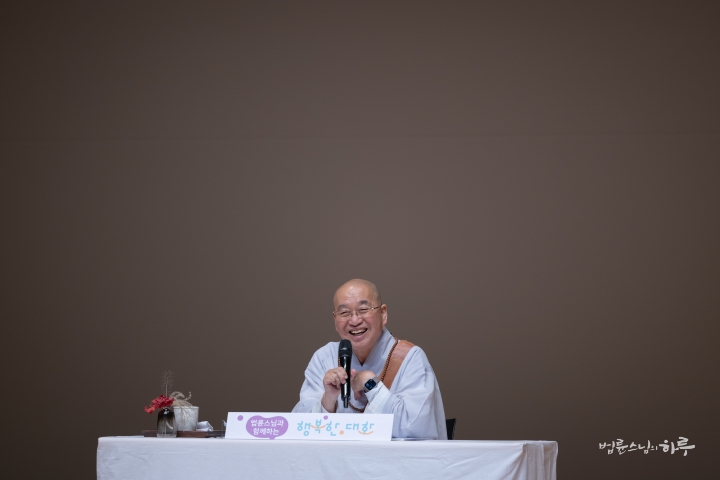
“Hearing you say that, it sounds like you don’t want to change. Even saying ‘I’ll do anything more extreme than electric shock if it can fix this’ would barely work, but excluding electric shock therapy and thousand prostrations means you don’t want to change. Just live as you are. Because if you’re born to Gyeongsang Province parents, you naturally learn from them and develop what’s called Gyeongsang Province temperament. Seoul people have Seoul temperament, Hamgyeong Province people have Hamgyeong Province temperament. Isn’t it good to preserve regional characteristics? (laughter)
But you need to fix getting angry. Being blunt is fine. ‘Eat up!’, ‘Bed time!’ – these are fine. But getting angry means you have a nasty temper. That has nothing to do with being from Gyeongsang Province.”
“I don’t really do that outside. When I’m working outside, I’m not someone who gets angry that much.”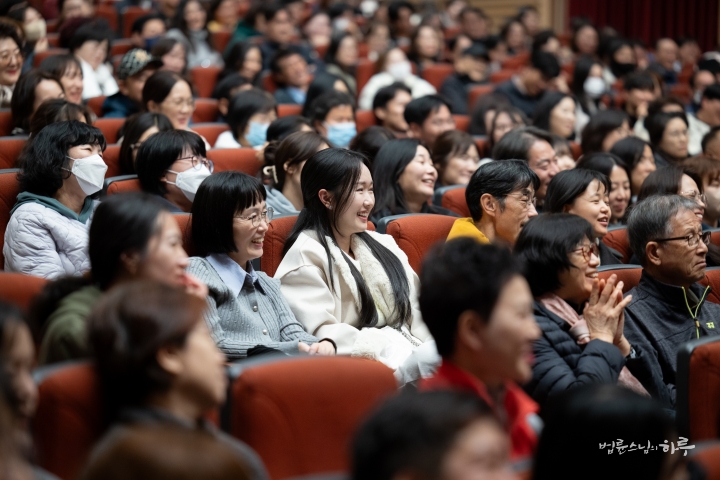
“Everyone is like that. Because outside, we think the other person is different from us, so we endure a bit. But with people close to us, first, we don’t stay tense and let our guard down, and second, because they’re close, we think they should be the same as us, so we can’t tolerate even small differences. When married, dating, or between parents and siblings, we think ‘we should be the same,’ so we can’t tolerate even small differences. But with others, we think it’s natural to have differences.
That’s why most irritation is directed at people close to us, namely family. What you show outside is a disguised appearance, and what you show at home is your true self. In other words, what you show outside is your made-up face, and what you show at home is your bare face after washing. Like that, what you show at home is your original karma. I also get irritated with people close to me in daily life. That’s my original nature. But this appearance of talking in front of you all is not my true self. Would a monk lose his temper in front of so many people? That would make me truly crazy. Everyone is like that. It’s not hypocrisy; that’s just how people are. At home, you have to live with family all the time, so you can’t fake it. It’s good to be careful, but it’s not something that changes easily with effort. The only way to change is to be reborn. Jesus was reborn after fasting and praying for 40 days in the wilderness, and Buddha was reborn after six years of ascetic practice. But you don’t even want to do a thousand prostrations, so how can you be reborn? So don’t even dream about it and just live as you are.” (laughter)
“Yes, thank you.”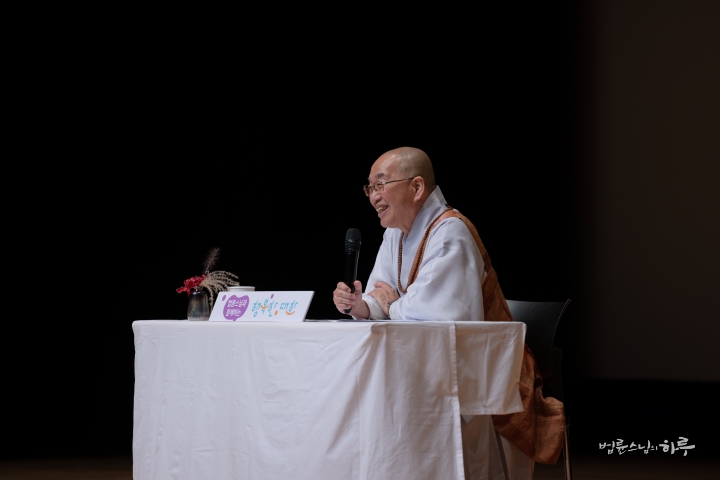
“You can change if necessary. But thinking you should change doesn’t help at all. Even if you think you should change, it doesn’t change easily. If you think you should change but can’t, you’ll engage in self-abuse and develop self-distrust, ultimately tormenting yourself. So it’s better to have the perspective of ‘I’ll live as I am’ or ‘This is good enough.’ On that foundation, if you think it would be good to change for your children, you can try. But it’s fortunate if it changes, and it’s okay if it doesn’t. You need this perspective to avoid suffering. An attitude of ‘This is good enough’ won’t do. That’s complacency. If you decide to change, you need to be prepared to die. You need to be determined enough to think ‘I’d rather die than not fix this.’ Then it will change. There’s nothing that can’t be changed. Jesus was reborn from a carpenter’s son to the Son of God, and Buddha was reborn from an ordinary being to Buddha. To change unconscious habits, you need to die once and come back to life. Only then can you change. Go to a temple and follow Buddha’s six years of ascetic practice, or go to a church and follow Jesus’s 40-day fasting prayer. But church is a bit better. It’s only 40 days. (laughter)
First, it’s okay to live as you are. It’s okay to get angry and irritated sometimes. But if the loss is too great, you need to fix it. Changing your temper isn’t impossible, but it’s difficult. To fix something difficult, you need two things. First, you need to give yourself a strong shock, and second, you need to do it consistently for a long time. Doing it once won’t work. You need to do it consistently like 100-day prayer, 1000-day prayer, 10,000-day prayer. And you need to give yourself a somewhat strong shock to change your temper. But that requires awareness. You need to have the awareness in your heart that ‘getting angry is really bad for the children’ for your unconscious to change. It won’t change just by listening to others and thinking ‘I should fix this.’ So if you’ve decided ‘I won’t get angry,’ give yourself the penalty of a thousand prostrations when you do get angry. If you keep giving yourself penalties like this, you’ll eventually have to change. Having to do prostrations for two hours after getting angry once is so hard that your unconscious awakens. Even when anger rises up, you’ll think ‘Oh no, I have to do prostrations again’ and the anger will subside.” 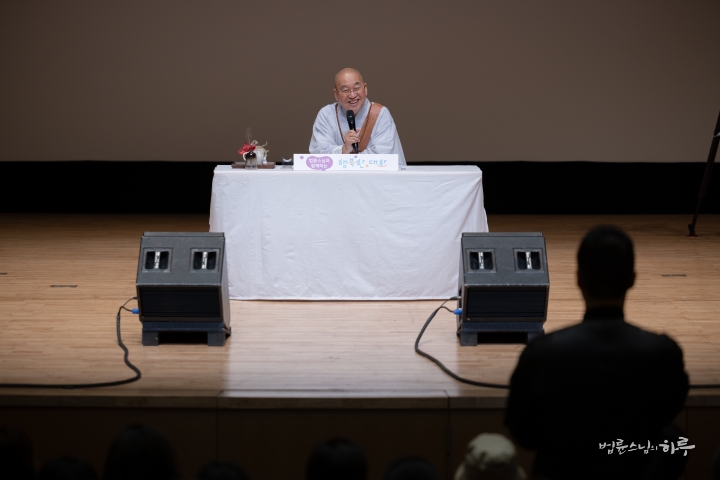
“Until I asked this question today, I thought I had a big problem. I’ll just live as I am. Since I can’t follow Buddha or Jesus, I’ll just live as I am and continue to live happily as I do now. Thank you.”
“It’s fine to live as you are, your way of speaking is fine, everything is fine. However, getting angry is a symptom of madness. Getting angry causes great harm, so you shouldn’t just live as you are in that regard. Because the damage is significant, you must fix this. If you just pay attention to that, everything else is fine.”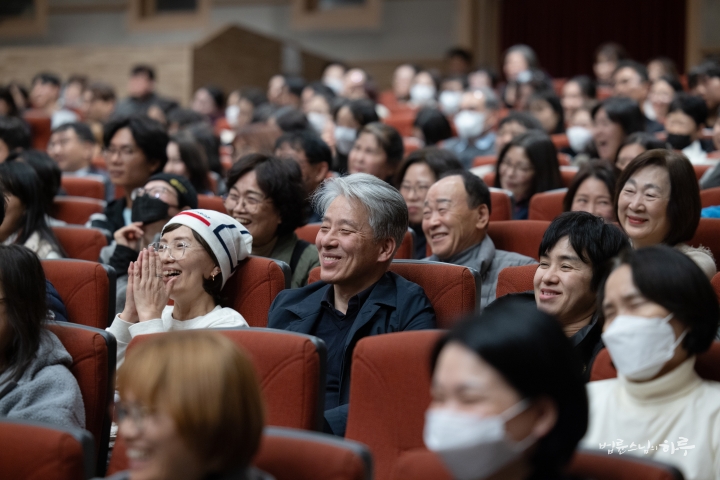
Questions continued to follow.
After resigning from my job, I’m facing multiple challenges at once: divorce, my father’s death from acute leukemia, inheritance tax investigation, and refund lawsuits, all while raising my son. How should I approach life amid these complex difficulties?
My supervisor in the same department has a rough and provocative way of speaking, facial expressions, and giving instructions, causing daily stress that makes work life very difficult. How can I cultivate a mindset to be happy at work in this situation?
Since childhood, my mother has blamed me for the pain of childbirth and raising children, and even now her excessive expectations make me feel constantly guilty. I also have high expectations for my daughter. How can I observe and let go of these feelings?
As someone interested in politics before becoming a voter, I’m confused about what standards to use due to political news and extreme opinions from adults around me. How do you think we should view politics and politicians?
I’m a working grandmother now living with my granddaughter. The connection between my granddaughter and her mother has been severed, but my granddaughter misses her mother. What should I tell her?
My children are 15 and 11, and I find myself nagging them constantly. I also nag my husband who doesn’t set a good example for the children. What should I do to help my children become proper human beings?
I’m a woman in my late 30s with a job. I’m troubled because I feel like people don’t like me. When I feel that no one truly cares for me, it makes me very sad.
As the conversations continued, it was time to conclude. Sunim offered closing remarks.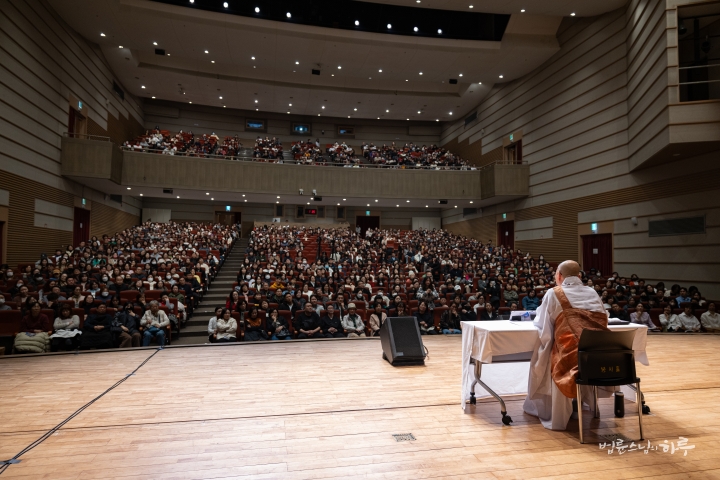
“Was it fun?”
“Yes.”
“Was it beneficial?”
“Yes.”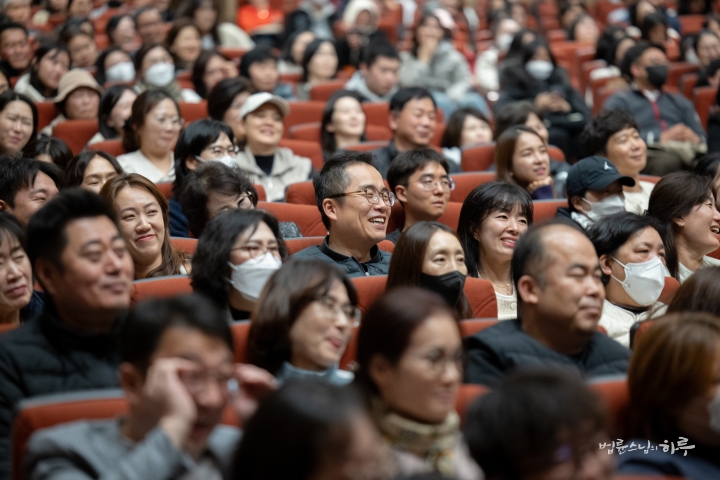
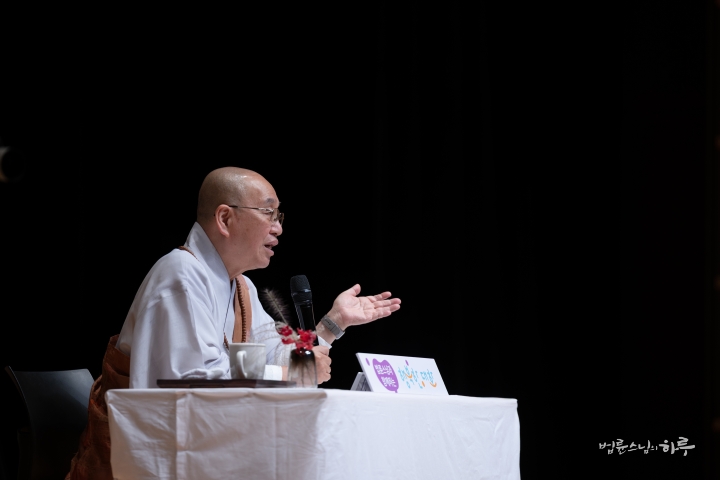
“Having fun means that at this moment you’re neither sleepy nor bored. However, while comedy that makes us laugh heartily is fun to watch, it often leaves us feeling empty the moment we walk out the door. There needs to be something beneficial for it to remain in our hearts for a long time. So first, it should be fun in the present, and second, it should contain beneficial content to be good for a long time.
Another important thing is that ‘it should be good for both you and me.’ This is the truth. There’s no need to think of truth as something difficult. If it’s only good for me, it’s hard for the other person to endure, and if it’s only good for the other person, I become exhausted. Such relationships cannot last long. We must move in a direction that’s good for both to be sustainable.
The conversation between the questioner and me today was the same. It wasn’t just good for the questioner; it was also good content for his wife. If it becomes a relationship where only the wife benefits and he suffers losses, he ultimately won’t be able to endure. Happiness is not built on someone’s sacrifice. When we find a path that’s good for both me and you, good for now and the future, only then does happiness continue. I hope all of you will live happy lives in that direction.”
The lecture concluded with loud applause.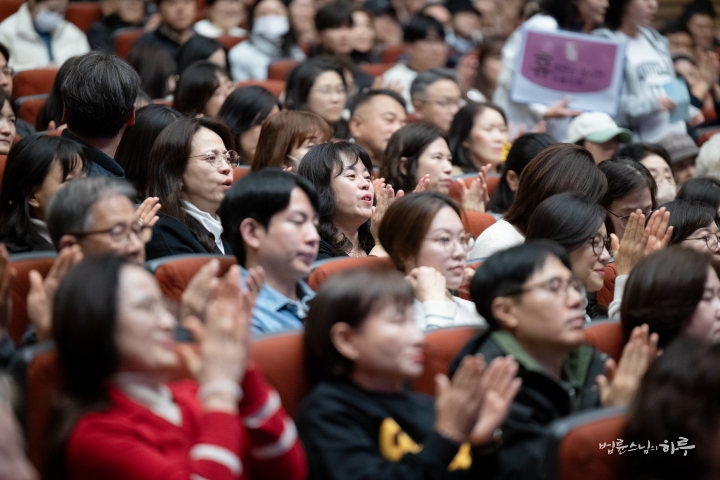
Since today’s lecture venue was provided free of charge, there was no book sale or signing event. After all the audience members left the hall, Sunim took a commemorative photo with the volunteers who prepared the lecture.
“Cheonan Happy Citizens, fighting!”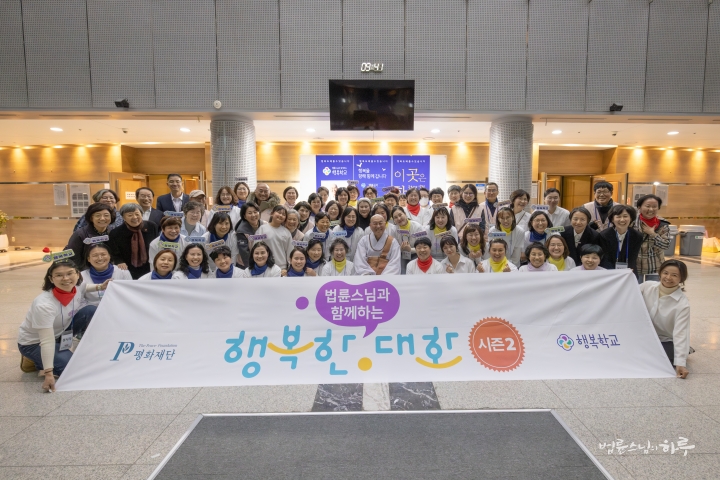
After expressing gratitude to the volunteers, Sunim departed from Cheonan City Hall and headed to Seoul.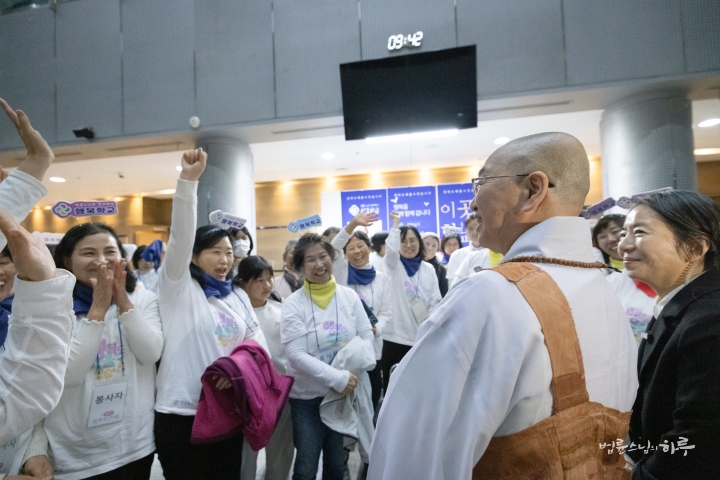
After a two-hour drive, Sunim arrived at Seoul Jungto Center after 11 PM and concluded the day’s activities.
Tomorrow, there will be a Jaja retreat(Pravāraṇā, the ritual of confession) all day with Senior Jungto Practitioners and the Dharma Teacher group. Sunim will give the opening Dharma talk, conduct Dharma Q&A, and deliver the closing Dharma talk. In the evening, he will attend the closing ceremony with the supporters who prepared the Youth Festival and give a Dharma talk.





